Productivity and Resource Planning for Agencies
Where the workload overview meets capacity planning.
Balance out work in minutes, understand your team’s utilization, and plan for growth. Prevent burnout and spot talent - all in a single view.
needed
Capacity Planning and Availability
Set, plan, and optimize team and individual workloads across projects and clients by setting custom, individual capacity—drag-and-drop tasks from one person to another to bring in balance. Individual availability is visible when setting due dates.
↳ See all in Capacity Planning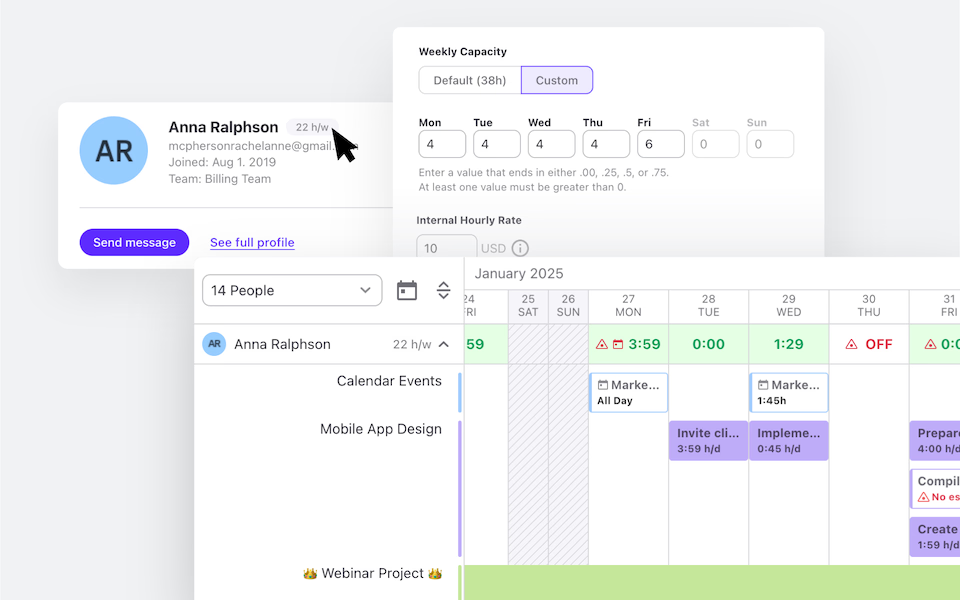
Workload Management
Save yourself days of planning and hours of meetings. A single overview of your team’s availability, projects, and tasks through time, capacity, and workload.
↳ See how Workload View works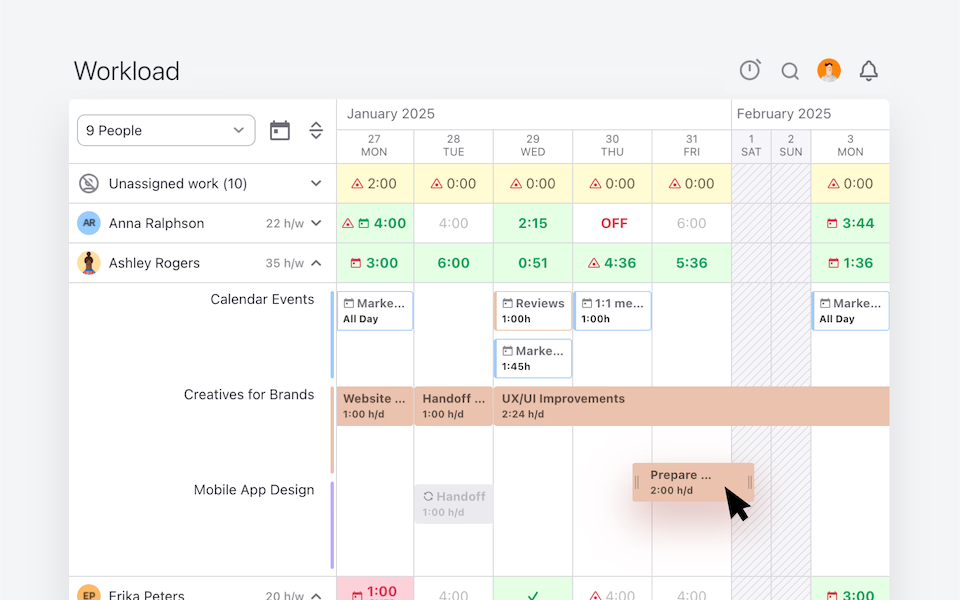
"ActiveCollab helped in making the transition smooth when we were pushed toward home working and was one of the key factors in maintaining the quality of our work."
Interior Designer, Havelkadesign
"ActiveCollab sounded too good to be true. We went into our trial period with low expectations – to our surprise and delight, we were proven wrong."
Founder and Creative Director, JUICE Creative Group
"ActiveCollab allows our teams to ask questions, track and update statuses, report time, and communicate effectively and efficiently."
Director, Strategic Accounts, Xivic
"We've gotten way more efficient with our time management and communication, and a big part of that is because of ActiveCollab."
Founder and Managing Director, Rock Agency
Integrated Stopwatch and Task Time Tracking
All you need is already in ActiveCollab. Track your time against a task or project budget. Understand your teams’ productivity and potential bottlenecks through timesheets and estimated vs. tracked time.
↳ See how Task Time Tracking works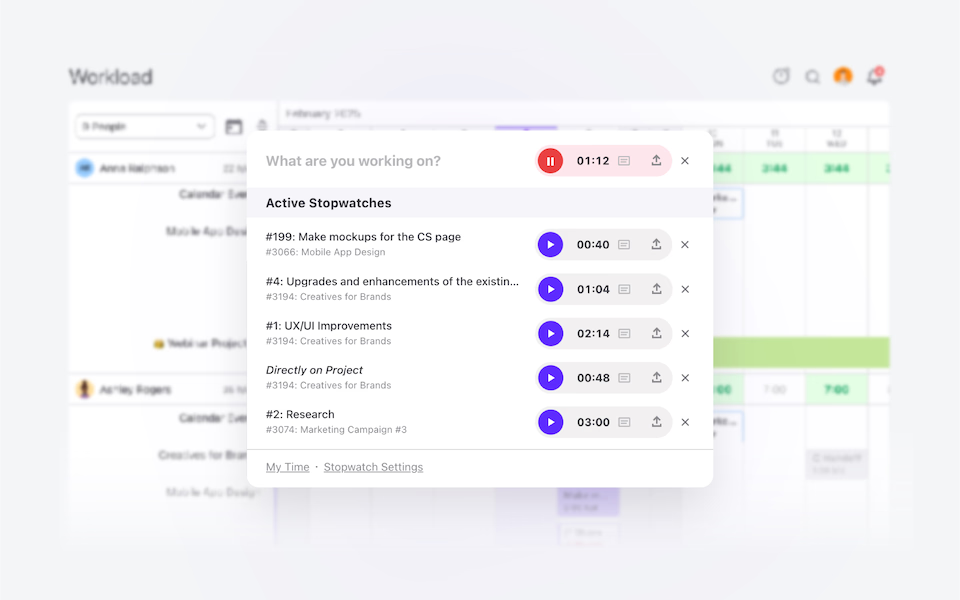
Your Business Growth with our Dashboards and Reports
Set a view on your dashboard to focus on the most essential elements of your business: project progress, profitability, time reports, individual or team productivity, estimated vs. tracked time, and more!
Time-Off Management
No emails, no spreadsheets—time off is set and managed in ActiveCollab. You’ll always be on top of vacation days, sick leave, and individual availability, knowing when to set a task due date and how to plan for maximum utilization.
↳ Time-Off Management in details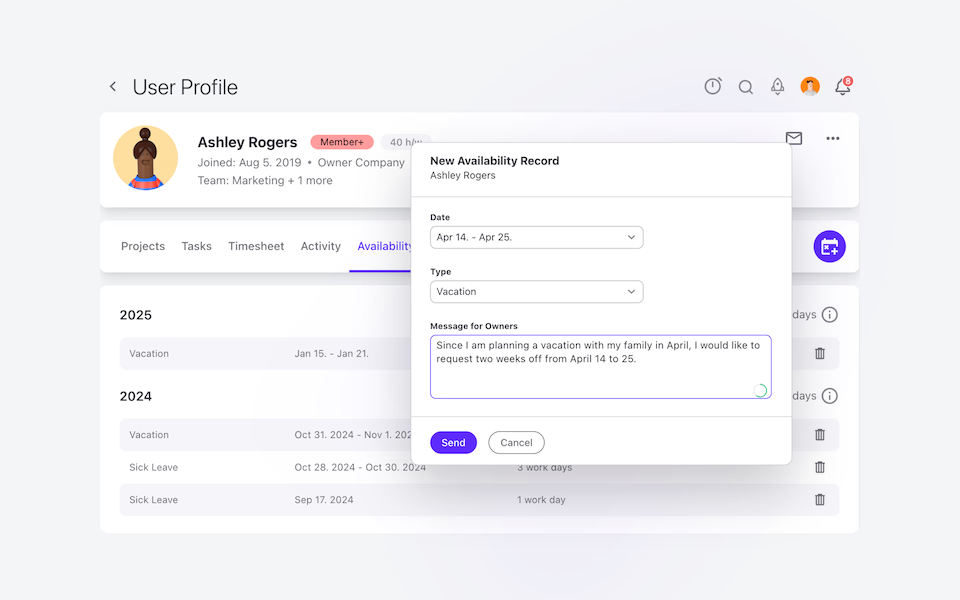
Virtual Users - Your Little Secret for Smooth Growth
Use virtual users to set up tasks, onboarding, and projects for your newcomers or plan for growth. Add as many virtual users as you need at no cost.
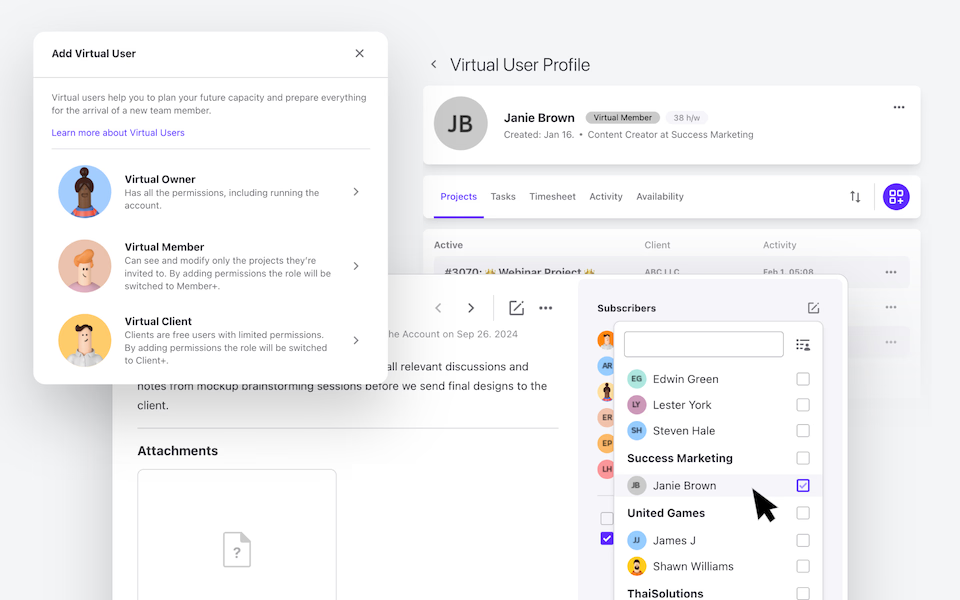
Success and Support
50K Teams
93%
Happiness Score
Help Center
Additional Onboarding Services
Engaged Community
Frequently
Asked
Questions
Here is more info to help you decide. Contact our Customer Success team if you have other questions.
ActiveCollab keeps everything in one place – tasks, budgets, and progress. Instead of chasing updates in emails or spreadsheets, you get a clear view of where projects stand.
That clarity helps teams focus on the work that matters instead of wasting energy on coordination! When projects run smoother, deadlines are easier to hit, and clients get better results.
It’s about giving your agency the structure to spend less time managing and more time delivering!
Yes! ActiveCollab tracks both types of hours so you can see exactly how effort is divided. That visibility highlights where revenue is coming from and where time slips away.
It’s an easy way to uncover hidden drains on profitability.
Once you know the numbers, you can rebalance priorities, protect margins, and make better decisions about how your team spends its time!
Scheduling becomes easier when you know who’s available and what they’re working on!
ActiveCollab gives you that visibility so you can assign projects with confidence. Instead of overloading people or relying on guesswork, you can create timelines that fit both client expectations and team capacity.
The result is fewer missed deadlines, smoother collaboration, and projects that move forward without constant adjustments.
Yes! ActiveCollab lets you set time estimates on tasks and then compare them against actual tracked hours. This shows where projects go over budget and where your planning is accurate.
Over time, that feedback helps you improve forecasting and reduce scope creep. It also gives you hard data to set client expectations more confidently. Planning becomes less about guesswork and more about learning from every project your team delivers!
ActiveCollab connects tracked hours and budgets with reporting, so you can see which projects are profitable and which ones consume more resources than they should.
This gives you clarity to make better business decisions – whether that’s adjusting pricing, improving processes, or prioritizing high-value clients. Instead of treating all work equally, you get a clear picture of what truly drives growth and what holds margins back.
Yes. ActiveCollab allows you to assign resources by role, skill set, and responsibility. That means work is matched to the right expertise, not just whoever happens to be free.
Designers focus on design, developers on development, managers on oversight. This structure reduces misalignment, improves quality, and ensures projects move forward without unnecessary delays.
When everyone works in their strengths, results are better, and teams stay more engaged.
Growth brings complexity, and without structure it becomes harder to manage. ActiveCollab helps by centralizing resource planning, productivity tracking, and financial insights!
You can see how your team’s time is being used, spot inefficiencies early, and plan confidently for new projects. This makes scaling less about trial and error and more about making decisions backed by real data.
The result is obvious – steady, predictable growth without overextending your team!



